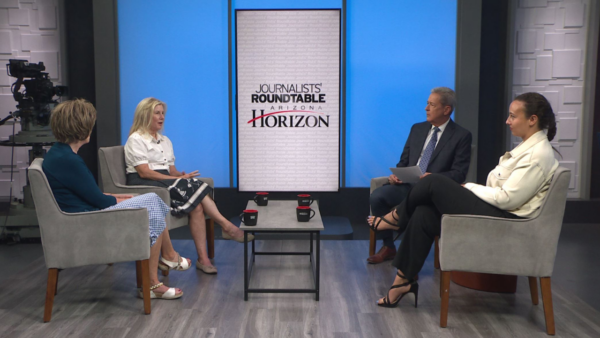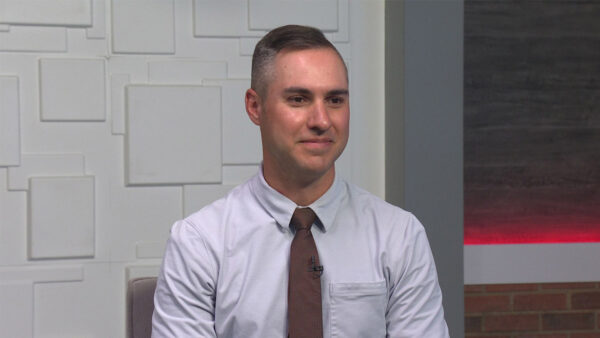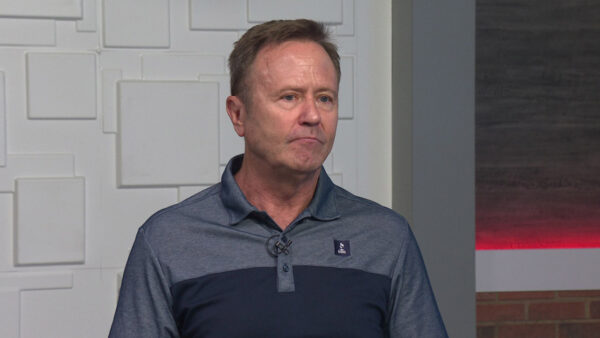Federal officials have approved a plan that makes about 22-thousand low income Arizona children eligible for Arizona’s “KidsCare” health insurance program. In addition, the plan helps three of the State’s largest hospital systems cover costs of providing uncompensated care. Maricopa Integrated Health System CEO Betsey Bayless explains how the plan is designed to work.
Ted Simons: Good evening, and welcome to "Arizona Horizon." I'm Ted Simons. Former State Representative Daniel Patterson, a long-time Democrat, will be replaced in the legislature by an Independent. Patterson changed his voter registration after his fellow Democrats demanded his resignation for a variety of alleged ethics violations. Secretary of state Ken Bennett said today that Patterson registered bark as a Democratic 25 minutes after he resigned, which means according to Bennett, he was a registered independent when he stepped Eclipse Educational version only -- not for commercial use
Ted Simons: State will soon start accepting applications for medical marijuana dispensaries, after the attorney general's office signed off on the program. Dispensary applications will be accepted from May 14th to May 25th with up to 126 dispensary permits expected to be issued by early August.
Ted Simons: Federal officials have approved a plan that makes about 22,000 low-income Arizona children eligible for the state's KidsCare health insurance program. In addition, the plan helps three of the state's largest hospital systems cover costs associated with providing care to the uninsured, and all of this is accomplished with no additional state funding. Here to explain all this is Betsey Bayless, President and CEO of Maricopa integrated health system. Good to see you again. Thanks for joining us. Last time we had you on, this was hoped for. It's done now.
Betsey Bayless: Yes, it is. The money hasn't arrived. But we did get the OK from the federal government.
Ted Simons: So explain, give us a general explanation of what's going on with your organization, and others, and what that is drawing into the state.
Betsey Bayless: OK. I would be happy to do that. If I could just take a little poetic license here, Maricopa integrated health care system is the only public hospital only public health care system in Arizona.
Betsey Bayless: We have the Maricopa medical center, two psychiatric hospitals, 11 clinics. And a health plan. Last year the state legislature cut access by about a third, the AHCCCS -- the AHCCCS plan, which is our state Medicaid. Since my system is about 65% AHCCCS, we saw an immediate drop in funds coming in and in a big increase in uncompensated care. This was going on across the state of Arizona, we felt it particularly hard. So I got together with Phoenix Children's Hospital, and they have a huge Medicaid population as well. And also University of Arizona health network. Which has a huge Medicaid population. And we created a program, now, this was a year ago. We created a program whereby we would go to the federal government, pay a match, and draw funds down. Into our systems. Now, I want to thank Governor Brewer for helping us. And also Tom Metlack and the whole AHCCCS crew. They were very helpful in doing this. And I particularly want to thank Governor -- Congressman Ed Pastor, because during the course of this year we've had so many times when the federal government said, we're not going to do this. And each time the Congressman would jump in and make it happen. So what we will be doing, we will be putting up over $100 million, the three of us, and drawing down 300 million. And out of that 300 million, 44 million is going to be carved out and it's going to go to KidsCare. The program that insures children. And we have agreed to fund 22,500 children. KidsCare used to have something like 57,000, and then it dwindled, and now it's about 11,000, because it's frozen. So this will be a boost although it certainly not going to do the whole job.
Ted Simons: I was going to say, there's over 100,000 on the waiting list. But something is being done here. This is considered a bridge, is it not, until 2014?
Betsey Bayless: It is a bridge to 2014. We don't know what's going to happen in 2014. If health care reform goes forward, then people who aren't insured, they will have health insurance. If it does not, I think you will see the federal government and the state government turn around and look at programs like this and say, we've got to continue this.
Ted Simons: What -- Maricopa medical center, what are you seeing there you mentioned when the money goes down, all of a sudden the patients go up and it's a very bad formula. What are you seeing on the ground?
Betsey Bayless: Well, we used to have about $5 million a month in uncompensated care. In March of this year, it was $10 million. So after the state made the changes in AHCCCS reimbursement, it's climbed steadily, so now we're at $10 million a month. We can't do that. I went to the governor and I said, we can't sustain this. You've got to help us do something. So we can survive and take care of the people -- the people don't go away, the money might go away, but the people need care.
Ted Simons: With this money coming in, obviously it helps as providing care to the uninsured, helps regarding KidsCare. And as far as -- I guess infrastructure improvements to the three organizations, that's there as well, correct?
Betsey Bayless: That is not.
Ted Simons: It is not there?
Betsey Bayless: The next step that you'll be hearing about is what's called the improvement pool. This is the safety net care pool. Now, the improvement pool is the next thing we're going to be working on, and it's going to focus on expansion of services. Now, it can't be just capital, but expansion of services could include services that require new offices or something like that. So we're very anxious to get started on that.
Ted Simons: We've got you three, ponying up over $100 million, drawing a couple million from the feds totaling $300 million, no cost to the state. Is that enough? How far does it go?
Betsey Bayless: Well, that's not enough. I'm just talking about three systems in the state of Arizona. You can talk to any health care system and they're going to tell you the exact same story to a less -- much lesser degree than I have. But they're all hurting. And they all want to get in on something. Now, the issue with this program is, you have to have a government partner because the match money has to be public money. We're a government, so we can do that. Phoenix children's uses a matching conjunction with University of Arizona, and the U of A health network matches with Pima County.
Ted Simons: Last question -- money not here yet, but should be here soon? Early May I heard? Maybe?
Betsey Bayless: I doubt it. We have to fund KidsCare May 1st. And so we have said, please, if we're going to fund KidsCare May 1st, get us that money as quickly as you can. I would hope it would be in June. I can't promise that. I know all of us have been since October really hurting and needing this money.
Ted Simons: Well, it sounds like things are moving forward. Congratulations on that. It's good to have you here. Thanks so much for joining us.
Betsey Bayless: Thank you very much.
Betsey Bayless:CEO, Maricopa Integrated Health System;























